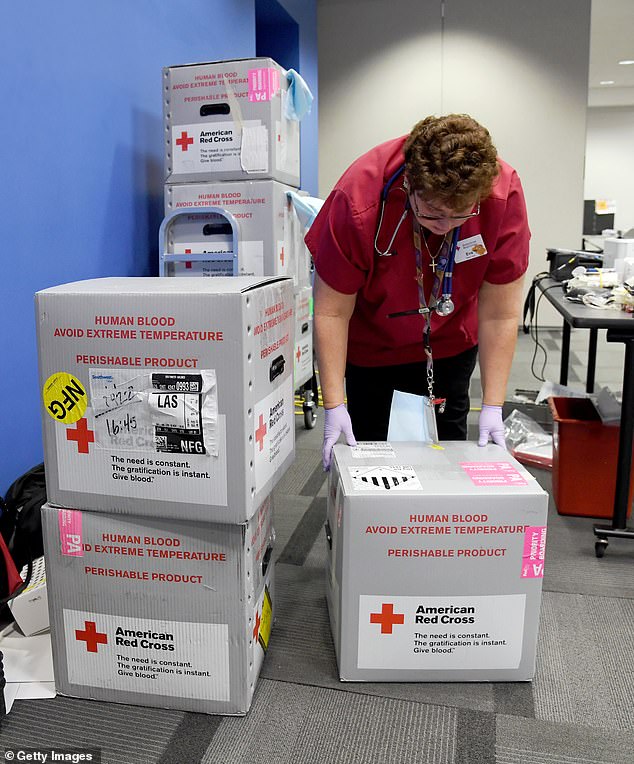Red Cross says it is facing a life-or-death blood shortage as donor numbers fall to lowest levels in 20 years
The U.S. emergency blood supply has reached critically low levels, prompting the nation's largest blood supplier to issue a life-or-death blood shortage emergency.
The American Red Cross declared a nationwide blood shortage on Sunday, saying the number of people donating through the organization recently fell 40 percent — the lowest level in two decades.
The humanitarian nonprofit, the country's largest blood supplier, stressed that donations are urgently needed to ensure life-saving medical treatments and procedures can continue without delay.
Dr. Pampee Young, chief physician of the Red Cross, said: 'One of the most distressing situations for a doctor is a hospital full of patients and an empty refrigerator without blood products.
'In our country, a person needs life-saving blood every two seconds. Its availability could be the difference between life and death. However, blood is only available through the generosity of those who roll up their sleeves to donate.”

The Red Cross is the country's largest blood supplier and emphasizes that donations are urgently needed to ensure life-saving medical treatments and procedures can continue without delay
In an effort to entice people to donate, the Red Cross is teaming up with the National Football League to give people who donate blood products the chance to win a trip to the Super Bowl in Law Vegas next month.
A person in the US needs a blood product approximately every two seconds, and more than 40,000 units of blood products are needed every day.
The Red Cross reports that 16 million blood products are transfused annually.
The organization said there was a shortage of 7,000 units of blood donations between Christmas and New Year's Day, which could have a huge impact on the availability of blood products, but could also have dramatic consequences for people in need of a life-saving blood supply. transfusion.
The Red Cross is also concerned that the increasingly severe cold winter season will deter people from donating and “affect the future turnout of donors, exacerbating the poor blood supply situation the country currently faces.”
The organization attributes the decline in donations to several factors, including the Covid-19 pandemic, which accelerated the decline in donor numbers.
Medical director Dr. Eric Gehri said the Red Cross has lost 300,000 donors since the pandemic.
Additionally, eligibility to donate blood was updated prior to the pandemic, which raised some of the minimum thresholds for donor requirements, resulting in fewer people being able to donate blood.
Ivy Ward, the mother of a nine-year-old child with B-cell acute lymphocytic leukemia, told the Red Cross that her son has received more than 20 blood products since he was diagnosed with the disease in 2021.
She said: 'The hospital floors are full of children who need that blood and otherwise wouldn't be able to survive without it.
“Without donated blood products, (my son) wouldn't be here today.”
Dr. Gehri told CBS News: 'Doctors have to make choices about which patients can receive a transfusion on a certain day. Surgeries such as heart surgery may be postponed until available blood is collected and sent to the hospital.”
The Red Cross first warned of the dire situation in September 2023 and declared a national blood shortage on September 11. It said the country's blood supply has fallen by almost 25 percent since August.
While the Red Cross said all types of blood are needed, there is a growing need for platelet donations for trauma and cancer patients and for donations of blood type O negative, or the “universal donor.”
Type O negative blood can be given to patients with any blood type, but only seven percent of the U.S. population has this type.
Due to the critical shortage, the organization said it had to limit the distribution of type O blood products.
January is National Blood Donor Awareness Month, a month-long campaign aimed at increasing awareness and participation in blood donation.
People can donate whole blood or blood components, including red blood cells, which are typically given to trauma patients, or platelets, which help blood clot and are used for cancer treatments and organ transplants.
A single car accident victim can require as many as 100 units of blood, according to the Red Cross, and blood cannot be manufactured; it must come from a donor.
All donations last one to three hours and one volunteer donor can save several lives.
To donate blood in most states, you must be at least 17 years old, weigh at least 250 pounds, and be in good general health.
Certain types of medications, chronic conditions, and recent travel can all affect a person's eligibility to donate.
